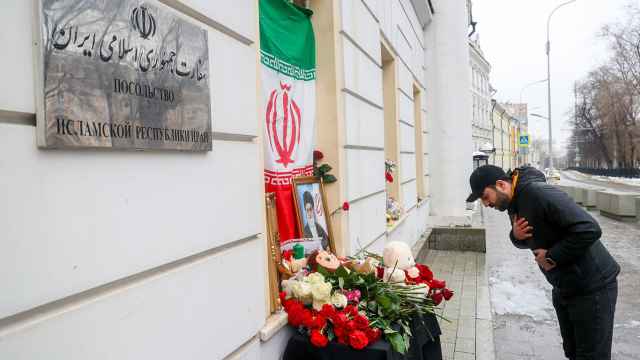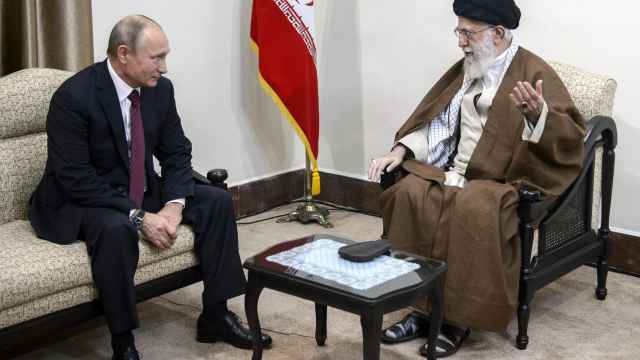Russia figures again in the U.S. administration's latest anti-corruption case, which has cost a Swiss logistics company and its clients a total of $236 million to settle.
The company, Panalpina, was accused under the Foreign Corrupt Practices Act of making illegal payments totaling at least $27 million to officials in seven countries, including $7 million to Russian officials, between 2002 and 2007. Customs officials were mentioned prominently as recipients of those payments.
Panalpina made a deferred prosecution agreement with U.S. authorities and said late last week that it received "significant benefits … in the resolution of the case," including a reduction in fines, because of its cooperation with the investigation and implementation of internal reforms.
The U.S. Justice Department told The Moscow Times that deferred prosecution agreements are commonly used in corporate cases, as they stimulate cooperation in exchange for the defendant avoiding a criminal record.
Six Panalpina clients were also charged as part of the case. They include a Nigerian subsidiary of Royal Dutch Shell, four firms that provide services to the oil industry, and a U.S. shipping company.
In the civil action suit filed in Houston by the Securities and Exchange Commission, Panalpina is accused of "making improper payments on behalf of issuer customers to government officials in Russia, Kazakhstan and other parts of Central Asia." Those payments were then billed to the clients in invoices that contained "a discrete line-item charge."
No other information about Panalpina's actions in Russia was made public.
A Panalpina spokeswoman in Moscow declined to further comment on the case. Panalpina has offices in 10 Russian cities.
Panalpina agreed on an $11.33 million fine, which is the sum the company made in profit from its illegal actions, according to the estimates of the securities regulator. Panalpina will also pay $70.56 million in penalties based on criminal charges filed by the U.S. Justice Department.
It is unclear whether Panalpina will face charges in Russia.
The Prosecutor General's Office could not be reached. Alexander Smelyakov, head of the Federal Customs Service public relations department, told The Moscow Times that he did not know the details of the Panalpina case.
Kirill Kabanov, chairman of the National Anti-Corruption Committee, told The Moscow Times that no Western company has ever been charged in Russia with corruption.
"What's the real risk of corruption?" he said. "It's facing charges in the United States!"
"Western companies face the choice of playing by the rules or by playing on the same level" as non-Western companies that do not hesitate to use corrupt practices to progress on the market, he said.
This is only the latest of several international corruption scandals to involve Russia. Siemens was convicted in December 2008 of paying $1.4 billion in bribes worldwide, including about 2 million euros that went to midlevel Russian telecommunications executives, between 2001 and 2007. It subsequently paid more than $1.6 billion in fines in Germany and the United States, and $1 billion in costs for internal investigations and reforms.
The Hewlett-Packard company is also under investigation for violations of the Foreign Corrupt Practices Act in connection with accusations that its German subsidiary used bribes to obtain a $44.5 million contract to supply IT equipment to the Prosecutor General's Office. That investigation is currently being expanded. The German government is investigating as well.
In April of this year, German carmaker Daimler and its Russian subsidiary pleaded guilty in a U.S. court to paying $56 million in bribes between 1998 and 2008 to officials in 22 countries, including Russia. Like Panalpina, Daimler made a deferred prosecution agreement with U.S. authorities, allowing it to avoid formal conviction in exchange for paying fines and implementing reforms within a set time period.
Kabanov sees a need for solidarity among Western companies to stand up to corruption, but he is skeptical of voluntary anti-corruption pacts, such as the one foreign companies, including Daimler and Siemens, signed in April of this year. Kabanov pointed out that foreign companies can always turn to local "consultants" and partners to carry out corrupt practices.
A Message from The Moscow Times:
Dear readers,
We are facing unprecedented challenges. Russia's Prosecutor General's Office has designated The Moscow Times as an "undesirable" organization, criminalizing our work and putting our staff at risk of prosecution. This follows our earlier unjust labeling as a "foreign agent."
These actions are direct attempts to silence independent journalism in Russia. The authorities claim our work "discredits the decisions of the Russian leadership." We see things differently: we strive to provide accurate, unbiased reporting on Russia.
We, the journalists of The Moscow Times, refuse to be silenced. But to continue our work, we need your help.
Your support, no matter how small, makes a world of difference. If you can, please support us monthly starting from just $2. It's quick to set up, and every contribution makes a significant impact.
By supporting The Moscow Times, you're defending open, independent journalism in the face of repression. Thank you for standing with us.
Remind me later.





